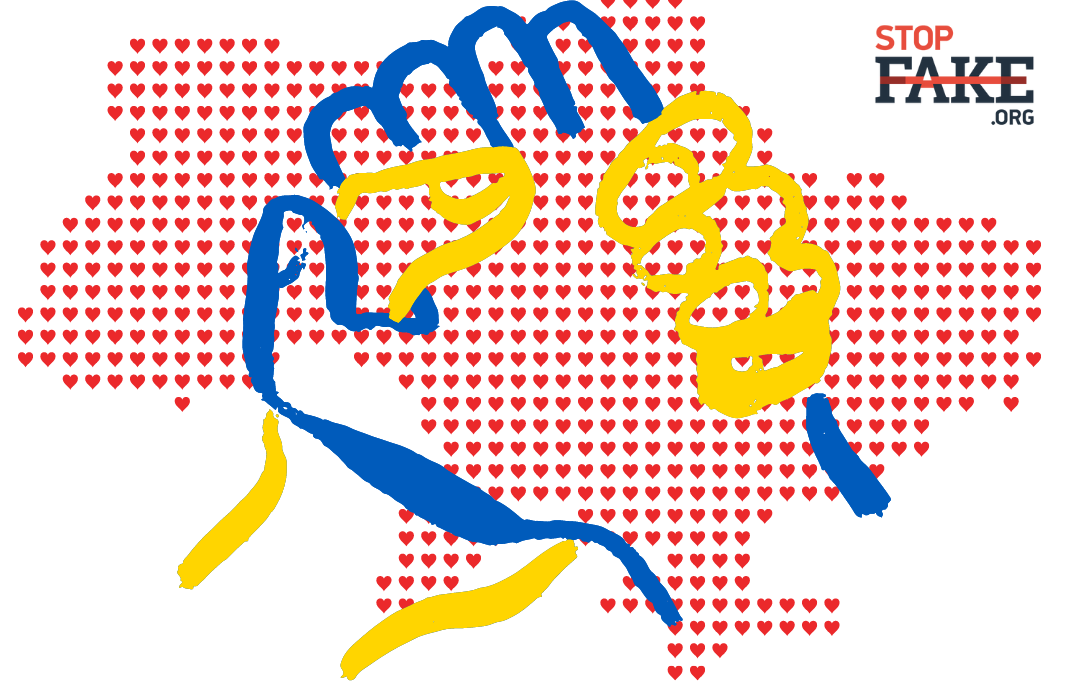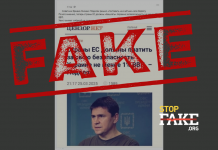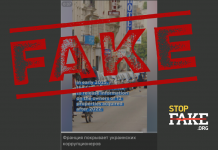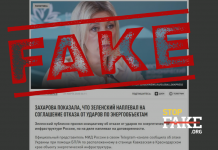Just before this latest Russian attack on Ukraine, I published an article entitled “The Battle for History and Building of Identity: Fake News confronts Professional News.[1]” Now when hostilities are going full blast, it is clear that this conversation should continue in order to analyze its three main actors: Russia, Ukraine, and the so-called “Collective West”. This conversation is about the world in which we live, a world which is facing enormous problems related to honesty and dignity.
Russia is an international terrorist and Russian society is Putin’s accomplice in crime
Russia’s attack on Ukraine has revealed many problems in mutual understanding, and the search for common ground in a globalized world. If we do not find a way to understand each other, we will simply destroy our planet. We should start with the definition of the “Ukrainian crisis.” It is not a crisis; it is a war. And it did not start in 2022, and not even in 2014. In fact, it has never stopped, it has been ongoing for centuries, ever since it became possible to talk about the history of Ukraine and the history of Russia.
It is very problematic to find common ground even among professional historians as to when these two histories began and what the actual difference is between Ukrainian and Russian cultural products. This is because Russia has never had any qualms about using a stolen name (prior to Peter the Great, what today is called Russia had a name similar to its capital: Moscovia), acting as no more than a marginal product of Mongol slavery.
That is why Putin is now trying to seize Kyiv, a city which is the capital of both modern Ukraine and of the state called Rus’ in the early Middle Ages – at a time when neither Moscow nor Russia, which dates back to the beginning of the 18th century, even existed. The history of relations between Ukraine and Russia is not only the history of the Ukrainian struggle for independence. Russian society deems it necessary to destroy Ukraine because that society perceives Ukraine as a mirror that it finds frightening to look into. That is why Russia is the existential enemy of Ukraine. This really is a question of life and death.
In addition to this irrational background of Russian imperialism (today – Putinism), there is another quite rational reason for Russia’s barbarous behavior towards Ukraine. Two days before Russia invaded Ukraine, Professor Robert Person and Ambassador Michael McFaul wrote that “Putin is threatened by a successful democracy in Ukraine. He cannot tolerate a successful, flourishing, and democratic Ukraine on his borders, especially if the Ukrainian people also begin to prosper economically.”[2] In other words, this is about two different political cultures and two different geopolitical choices taken respectively by Ukrainians and Russians.
Thanks to the inverted Russian public consciousness that inspired Vladimir Putin to create the world’s largest fake news factory, many names of criminal regimes and their practices, such as ‘nazism’, ‘fascism’, and ‘genocide’ have been depreciated. And now we are documenting genocide – the deliberate and systematic destruction of Ukrainians, Ukrainian cities, Ukrainian statehood, Ukrainian language, and Ukrainian history.
We are seeing numerous bodies of tortured and murdered civilians strewn on the streets of Ukrainian cities and villages liberated from the Russians, we keep hearing survivors’ recounting terror, harassment and rapes during the Russian occupation. In the temporarily occupied territories we see attempts to replace Ukrainian street names with Soviet names, to remove and destroy Ukrainian books and impose Russian as the language of instruction in Ukrainian schools.
Intercepted conversations of the Russian military in Ukraine with their wives and parents (published on social media) are unprecedented evidence of base and brutal family relations and a frightening insight into the degradation and depravity of Russian society. Russian mothers use profanity even more adeptly than their sons (such brutal communication is impossible in Ukrainian families and Ukrainians regard such speech as proof of Russians’ extreme barbarity). The wives of the Russian military are telling their husbands what household and clothing items they should steal from Ukrainian shops or loot from living or dead Ukrainians.
Russians are sending looted televisions, washing machines, air conditioners, electric scooters, video cards, batteries, children’s toys, women’s products, shampoos, shower gels, frying pans, etc. by post, other looted items, including stolen cars, are being sold at a specialized bazaar in Narovlia, a town in Belarus. This market was specifically opened for buying and selling possessions looted in Ukraine.
This shameful behavior has global consequences. In London, for example, an initiative was launched to bring old things and furniture, rags, used household appliances, and other rubbish to the Russian embassy – this is what the Russian army and its citizens really need today.
At the beginning of the 21st century, we must face a nation of looters, and this must serve as a warning to others: human regression is possible and you can observe it in Russian society. This society loves Putin [3] and supports a “final solution of the Ukrainian question”, i.e. complete destruction of Ukraine as a state and the physical annihilation of Ukrainians.
Special plans and ideological justifications were prepared for this purpose. The most eloquent is Russian political strategist Timofey Sergeytsev’s article explaining the need for a systematic destruction of Ukrainians and the Ukrainian state based on Putin’s policy goals.[4] It’s a matter of fact that Russian society is unable to look at itself ironically from outside and be horrified by the depth of its own degradation.
The Russians are afraid of us because they understand that we know everything about them. For centuries, Ukrainians have been witnessing Russian crimes. After the liberation of the suburban settlements near Kyiv, one liberal Ukrainian humanitarian, horrified by the mass killings, which the fleeing Russian military did not have time to hide, wrote on social media: “Your language is inhuman. Your literature is inhuman. Your whole “culture” is inhuman. Burn in hell, beasts. We will kill you all here. And after our victory, we will not leave you alone anywhere in the world, don’t doubt this even for a moment.”
It should be noted that fact-checking technologies will shortly allow the creation of a comprehensive evidence database for Russia’s and Russians’ crimes committed in Ukraine. For example, according to information gathered by InformNapalm, a volunteer intelligence gathering NGO, the soldiers of the 64th separate motorized infantry brigade of the Russian Defense Ministry’s combined army were the executors of the genocide of Ukrainians in Bucha, near Kyiv (photos and videos of their atrocities have been published in the world’s media).
This military brigade is stationed in Kniaze-Volkonskoje, a village of the Eastern Military District in the Khabarovsk area. The brigade commander is lieutenant-colonel Azatbek Omurbekov (patronymic – Asanbekovich), his email: [email protected], tel. (4212) 397103. Anyone who wants to can even find lists of all the looted items sent by the Russian military to their families, as well as the names of their relatives who are now using items that once belonged to murdered Ukrainians, as well as their addresses and telephone numbers in Russia.
Ukraine and the Collective West: the Need to Know Each Other
This war has demonstrated not only the amazing resilience and determination of Ukrainians to resist. This war is also a new articulation of old stereotypes in the attitudes towards Russians, who throughout their history have been unable to create anything of their own, but have always tried to steal what they liked from others. Such judgments are only now beginning to sound relevant in the global media context of the suddenly “awakened” collective West. It is also quite possible that the Bolshevik’s desire “to grab (something from somebody) and divide” does not come from Marxism as such, but has its roots in Russian tradition.
The Russian army wanted to plant fear in Ukraine and it wanted a blitzkrieg. Instead, it received contempt that only a free people can have for slaves who don’t have their own will and their own understanding of events. Russians were shocked and awed by the iron discipline, the highly-competent response of Ukraine’s Armed Forces, the country’s nationwide mass volunteer movement, and the fantastic self-organization of Ukrainian society. The nation of looters against the nation of volunteers – this is all you need to know about the Russian-Ukrainian war, a battle which still threatens to escalate into World War III.
The Ukrainian media discussion is developing in step with the evolving war. In a disrespectful and disparaging way, Ukrainians call the Russian military “moskals” and “katsaps” (historically pejorative Ukrainian terms for Russians that come from the 18th century), “orcs” (evil forces serving darkness from the novels by J.R. Tolkien), as well as looters, rapists, murderers (this corresponds to the demonstrated behavior of the Russian army), and Rushists ( from the famous neologism coined by Chechen leader Dzhokhar Dudaiev, who combined two meanings in one word: Russian and fascist).
The collective West can no longer hide behind pretended historical ignorance and “convenient” legends about the USSR as a “great ally” in the World War II struggle against German Nazism. Elementary common sense helps to understand that Stalin started the war as a natural ally of Hitler and only later, under certain circumstances, escaped punishment for the crimes of communism, including the “invention” of the GULAG concentration camps and crimes of the Holodomor (Great Famine). Today, we understand better than anyone, that unpunished evil continues to push Russia into committing new crimes against humanity.
The collective West has itself created an image of its clumsy counterpart in the form of tsarist Russia / Soviet Union / Putin’s Russia, which also played a certain positive role as it emphasized the properness of the Western way of life, allowed to admire the “mystery of the Russian soul”, its achievements in opera, literature, figure skating, and ballet. The problem is that all Russian culture is imperial and chauvinistic, permeated with hatred of other cultures and traditions.
A whole caste of admirers of the “great Russian culture” was formed in western think tanks, mostly paid by the Russians themselves. Until 2022, this caste continued justifying the “special path” of Putin’s regime. Their supporters, Western journalists with similar views, have long been given the informal name of “the Duranty club”[5] in Ukraine.
They were busy spreading Russian fakes and narratives, supporting the myth about the existence of independent journalism and free press in Russia, creating the modern pro-Russian discourse. According to Ukrainian political analyst Olexiy Haran, even now, during the war, international journalism was largely captivated by Russian propaganda and could present better materials with a real understanding of Ukrainian reality in a more professional sense[6].
Here we are talking about a deeper crisis of the collective West, which includes the impotence of the UN, the corrosiveness in the moral compass of the Red Cross, which is helping to gain “international approval” for a forced deportation of Ukrainians to the Russian Federation[7] during the current war, the open pro-Putin position of Hungary, which is a member of the EU, and other similar examples.
And what is happening beyond the borders of good and evil? Today there is a fair amount of viewpoints that, in fact, it was not Vladimir Putin who intimidated Russians when creating his totalitarian regime, but rather that Russian society found in Putin the much wanted “strong leader” embodying the entire spectrum of Russian imperial stereotypes and complexes. Such social mechanisms support the phenomenon of post-truth, when large segments of the national audience, without any pressure or coercion from the authorities, do not want to see a holistic and true picture of the world. Instead, they demand convenient and comfortable news only. In other words, they choose fake news.
Conclusions
If we compare Ukrainian and Russian social values, we will see that they differ dramatically. It is not just about different political interests, but about two completely different ways of thinking and of living, and, as has been mentioned above, two different political cultures. The demand for freedom of speech and the ability to think critically on the Ukrainian side is being attacked by the fake media reality and deep moral degradation on the Russian side.
Hence, the slogan “Kyiv versus Moscow”, coined by the Ukrainian liberation movement in the 20th century, is superimposed on the clash of the older, early modern metaphors: “Second Jerusalem” (Kyiv as a symbol of justice) is standing against the “Third Rome” (another name Moscow has chosen for itself to symbolize its imperial Russian despotism). In an interview with Polish journalist and literary critic Sławomir Sierakowski, Timothy Snyder said that “If Ukrainians were not fighting, the world would be a darker place”, “Putin’s ideology and propaganda got exhausted”; “Ukraine is acting bravely and wisely”.[8]
These days, looking at Ukraine as it defends its independence, dignity, and justice, many politicians in various countries of the world keep asking themselves: “How would my country and I myself behave in such a situation?”
Serhiy Kvit,
the president of the National University of Kyiv-Mohyla Academy,
professor at Mohyla School of Journalism
[1] Serhiy Kvit. The Battle for History and Building of Identity: Fake News confronts Professional News // Stop Fake, Oct 23, 2021: https://bit.ly/3iZ2Mo4
[2] Robert Person and Michael McFaul. What Putin Fears Most // Journal of Democracy; February 22, 2022: https://bit.ly/3jiFtG0
[3] According to a survey conducted by the Levada Center on March 24-30, 2022, support for Vladimir Putin’s actions by Russians rose to 83% (more than 10% compared to similar polls in January and February of that year); 15% of Russians “disapprove” of Putin’s actions. Interestingly, 51% of respondents said that the actions of the Russian armed forces in Ukraine have intensified feelings of pride in Russia: https://bit.ly/3DBGQJp
[4] Timofey Sergeytsev. What should Russia do with Ukraine? // Ria Novosti, Apr.3; The Ukrainian Post, Apr. 5 (in English): https://bit.ly/3LN2yg8
[5] Walter Duranty (1884-1957) – An American journalist who headed the Moscow bureau of the New York Times, interviewed Stalin, a 1932 Pulitzer Prize winner. He claimed that there was no Holodomor.
[6] Olexiy Haran. Exactly according to Goebbels: how Russian propaganda penetrates world TV channels // Local History, April 1, 2022: https://bit.ly/38e6w2S
[7] Euromaidan SOS Statement on inadmissibility of international “approval” of the forced deportation of Ukrainians to the Russian Federation: https://www.facebook.com/531592303/posts/10158568141847304/?d=n
[8] Tymothy Snyder: If Ukrainian were not Fighting, the World would be Much Darker // Texty.org.ua, 10 March 2022: https://bit.ly/3x58rBg





